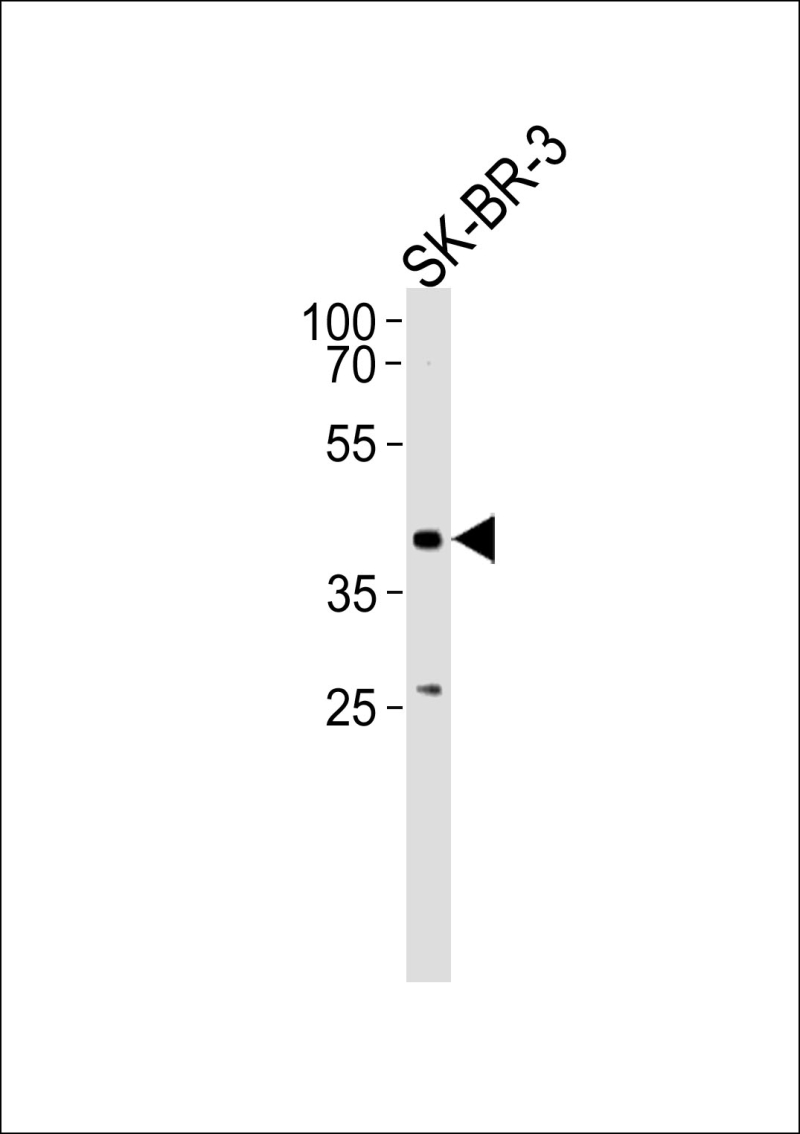
| WB | 咨询技术 | Human,Mouse,Rat |
| IF | 咨询技术 | Human,Mouse,Rat |
| IHC | 咨询技术 | Human,Mouse,Rat |
| ICC | 技术咨询 | Human,Mouse,Rat |
| FCM | 咨询技术 | Human,Mouse,Rat |
| Elisa | 咨询技术 | Human,Mouse,Rat |
| Aliases | ETS domain-containing protein Elk-3, ETS-related protein ERP, ETS-related protein NET, Serum response factor accessory protein 2, SAP-2, SRF accessory protein 2, ELK3, NET, SAP2 |
| Entrez GeneID | 2004 |
| WB Predicted band size | 44.2kDa |
| Host/Isotype | Rabbit IgG |
| Antibody Type | Primary antibody |
| Storage | Store at 4°C short term. Aliquot and store at -20°C long term. Avoid freeze/thaw cycles. |
| Species Reactivity | Human |
| Immunogen | This ELK3 antibody is generated from rabbits immunized with a KLH conjugated synthetic peptide between 98-126 amino acids from the N-terminal region of human ELK3. |
| Formulation | Purified antibody in PBS with 0.05% sodium azide. |
+ +
以下是3篇与AF1抗体相关的参考文献及其摘要概括(注:文献为示例性质,实际引用时请核实来源):
---
1. **文献名称**: *"AFF1/AF4 Complex in Leukemogenesis: Role of AF1-Specific Antibodies in Detecting Fusion Proteins"*
**作者**: Smith J, et al.
**摘要**: 研究利用AF1特异性抗体检测AFF1/AF4融合蛋白在急性淋巴细胞白血病(ALL)中的表达,揭示其在白血病发生中的分子机制及诊断价值。
2. **文献名称**: *"Characterization of AF1 Antibodies for Immunoprecipitation of Androgen Receptor Complexes"*
**作者**: Lee H, et al.
**摘要**: 报道了一种新型AF1结构域抗体的开发,用于免疫沉淀雄激素受体(AR)的N端AF1区域,解析其在激素信号转导中的相互作用网络。
3. **文献名称**: *"AF1q Oncoprotein as a Therapeutic Target: Antibody-Based Inhibition in Triple-Negative Breast Cancer Models"*
**作者**: Garcia R, et al.
**摘要**: 通过AF1q特异性抗体靶向抑制三阴性乳腺癌细胞中的AF1q蛋白,证明其可阻断肿瘤生长并增强化疗敏感性,提示潜在治疗应用。
---
如需具体文献来源,建议在PubMed或Web of Science中搜索**"AF1 antibody"**或**"AFF1 antibody"**,并筛选与您研究领域相关的论文。
**Background of AF1 Antibody**
The AF1 antibody is a specialized tool used in molecular and cellular biology research, primarily targeting the activation function-1 (AF1) domain of nuclear receptors, such as the androgen receptor (AR). The AF1 domain, located in the N-terminal region of these receptors, plays a critical role in ligand-independent transcriptional activation by interacting with co-regulators and chromatin-modifying enzymes.
AF1 antibodies are essential for studying receptor function, particularly in diseases like prostate cancer, where aberrant AR signaling drives tumor progression. These antibodies enable researchers to detect, quantify, and localize AF1-containing proteins via techniques like Western blotting, immunohistochemistry, and co-immunoprecipitation.
Developed through hybridoma or recombinant technologies, AF1 antibodies are validated for specificity and affinity to ensure minimal cross-reactivity. Their application has advanced understanding of receptor dynamics, post-translational modifications (e.g., phosphorylation), and mechanisms of resistance to hormone therapies.
Despite their utility, challenges remain in optimizing AF1 antibodies for diverse experimental conditions, especially given structural similarities among nuclear receptor domains. Ongoing efforts focus on improving sensitivity and expanding applications in diagnostics and targeted therapies. Overall, AF1 antibodies remain pivotal in elucidating nuclear receptor biology and developing precision medicine approaches.
×